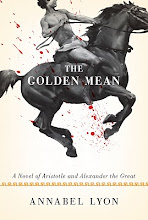
Aristotle's father, Nicomachus, was physician to Amyntas, king of Macedon in Aristotle's youth, father of Philip, grandfather of Alexander the Great. Nicomachus practiced a generation or so after Hippocrates, one of the fathers of medicine, and I imagine he must have absorbed some of the radical teachings associated with him, such as the avoidance of superstition and the keeping of detailed case notes. I also imagine that Aristotle must have acquired a good bit of his father's medical knowledge; he certainly had a lifelong interest in biology, and his books reveal snippets of the expertise he must have acquired at his father's knee (see, for instance, his discussion of black bile in relation to melancholy in the Problems).
Here's a modern translation of the Hippocratic Oath (thanks, Wikipedia!):
I swear by Apollo the Physician and Asclepius and Hygieia and Panaceia and all the gods, and goddesses, making them my witnesses, that I will fulfil according to my ability and judgment this oath and this covenant:
To hold him who has taught me this art as equal to my parents and to live my life in partnership with him, and if he is in need of money to give him a share of mine, and to regard his offspring as equal to my brothers in male lineage and to teach them this art–if they desire to learn it–without fee and covenant; to give a share of precepts and oral instruction and all the other learning to my sons and to the sons of him who has instructed me and to pupils who have signed the covenant and have taken the oath according to medical law, but to no one else.
I will apply dietic measures for the benefit of the sick according to my ability and judgment; I will keep them from harm and injustice.
I will neither give a deadly drug to anybody if asked for it, nor will I make a suggestion to this effect. Similarly I will not give to a woman an abortive remedy. In purity and holiness I will guard my life and my art.
I will not use the knife, not even on sufferers from stone, but will withdraw in favor of such men as are engaged in this work.
Whatever houses I may visit, I will come for the benefit of the sick, remaining free of all intentional injustice, of all mischief and in particular of sexual relations with both female and male persons, be they free or slaves.
What I may see or hear in the course of treatment or even outside of the treatment in regard to the life of men, which on no account one must spread abroad, I will keep myself holding such things shameful to be spoken about.
If I fulfill this oath and do not violate it, may it be granted to me to enjoy life and art, being honored with fame among all men for all time to come; if I transgress it and swear falsely, may the opposite of all this be my lot.

2 comments:
Dear Annabel,
I saw you speak last night at the Ottawa International Writers' Festival and came away wanting to read "The Golden Mean" and to learn more about you and your writing life. Your blog is terrific and I enjoyed the essay you published in the Quill and Quire (via the Random House website).
Thanks for being a terrific inspiration to a young Canadian writer.
Sincerely,
Erika.
http://erikacuccaro.wordpress.com/
Thanks, Erika! You're very kind.
Post a Comment